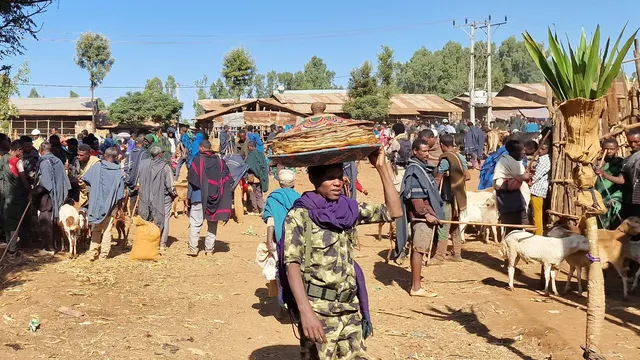
Fano rebels intensify fight against Ethiopian military in Amhara region
2025-04-11 04:14- Asres Mare Damte, a former lawyer, now leads Fano forces controlling most of Amhara.
- Fighting has intensified recently, with over 270 recorded battles between Fano and Ethiopian military.
- The situation highlights Ethiopia's ongoing struggle to maintain peace among diverse ethnic groups.
Express your sentiment!
Insights
Ethiopia has seen a significant escalation in conflict involving the Fano and government forces within the Amhara region. The Fano, comprising a loose collection of rebel groups, has heavily engaged in battles against the federal military, claiming to control over 80% of Amhara, which houses more than 22 million residents. Since mid-March, fighting has intensified, with recorded incidents increasing, including over 270 battles between the two factions from October 2023 to January 2024. The government's inability to maintain control has fueled unrest, with towns experiencing violence and families fleeing for safety. Human Rights Watch documented numerous attacks on civilians, with a particularly brutal episode reported in February 2024, when Ethiopian troops executed civilians in Merawi. The federal government has countered these allegations, insisting that civilians are never targeted. This conflict draws on longstanding ethnic tensions in Ethiopia, where the federal administration struggles to hold together diverse ethnic groups with competing interests. Despite ongoing negotiations, Prime Minister Abiy Ahmed cited the challenge posed by the Fano's diffuse structure as a hurdle in reaching a coherent agreement. This situation exemplifies Ethiopia's ongoing struggle to achieve peace and stability amidst regional and ethnic tensions.
Contexts
The Ethiopian civil conflict and ethnic tensions have been a significant issue impacting the nation's stability and development in recent years. Ethiopia is home to a multitude of ethnic groups, each with its own distinct culture, language, and history. This diversity has often been a source of pride but has also led to strained relations and periodic violent conflicts, particularly after the political reforms initiated in 2018 by former Prime Minister Abiy Ahmed. These reforms aimed to decentralize power and allow for greater political representation among ethnic groups, but they inadvertently exacerbated existing tensions and led to the rise of ethnic nationalism. The Tigray conflict, which erupted in November 2020, is one of the most intense manifestations of these ethnic tensions. The conflict originated between the Tigray People's Liberation Front (TPLF) and the federal government, leading to a humanitarian crisis with millions displaced and dire human rights abuses reported. Other regions, including Oromia and Amhara, have also seen significant violence, driven by inter-ethnic rivalries and struggles for control over resources. The involvement of neighboring countries and various armed groups has further complicated the situation, making resolution efforts more challenging. In response to these escalating conflicts, the Ethiopian government has attempted to implement various reconciliation initiatives and dialogues among the different ethnic groups. However, these efforts have often been undermined by ongoing violence and political disagreements. The key to lasting peace lies in addressing the underlying issues of land rights, political representation, and economic inequality that fuel ethnic grievances. International actors and organizations have expressed concern and urged the Ethiopian government to prioritize human rights and the protection of civilians amidst ongoing hostilities. The civil conflict in Ethiopia highlights the complexities and challenges associated with ethnic diversity in governance. Promoting a national identity that transcends ethnic divisions may be crucial for building trust and fostering unity among Ethiopia's diverse populations. Long-term solutions will require a commitment from both the government and local communities to engage in constructive dialogue and address the root causes of conflict. Only through inclusive governance and respect for human rights can Ethiopia hope to achieve stability and sustainable development in the face of its current ethnic tensions.